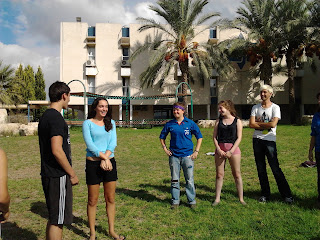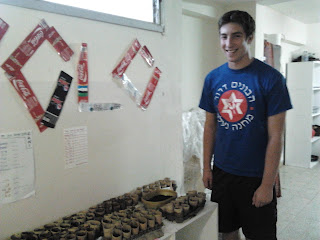"Ladies and Gentleman, the time for peace has come."
-Yitzchak Rabin, 1922-1995
The afternoon followed with peulot (activities) with Habonim Dror participants from Australia, New Zealand, England and South Africa. The chanichim greeted each other enthusiastically after their prior meeting on Yam l'Yam (Sea to Sea Hike). Friday's peulot were focused on the dilemma of peace as a value or peace as a strategy. The chanichim discussed quotes from different world leaders and philosophers about peace, and debated about how they saw peace in the world today. From there, they moved on to a discussion about the idea of peace in Israeli society today.
After Shabbat dinner, the chanichim had fun night peulot, ranging from a mock wedding to a slumber party to spray paint t-shirt stencils. On Saturday, the chanichim continued to discuss the Rabin's legacy. They explored the relationship between Zionist values and the Palestinian-Israeli conflict, before moving on to discuss Rabin's role in shaping this relationship and the opposition to his actions. Towards the end of the seminar, the chanichim learned about the incitement against Rabin in the lead up to the assassination, and what challenges this presented them with today in relating to manifestations of violence within the Jewish community and Israeli society.
Around 5:00pm, the chanichim headed to Tel Aviv to participate in the annual memorial rally. Speakers from diverse sectors of Israeli society spoke about the importance of Rabin's legacy in shaping the peace process and promoting democracy, including former Minister of Education Yuli Tamir, Mazkir (General Secretary) of Bnei Akiva Dan Hirschberg, members of Israeli youth movements and Rabbi Avi Gisser. An estimated 20 000 people were in attendance. Below, a picture from Haaretz newspaper, with Habonim Dror chanichim proudly represented.



















